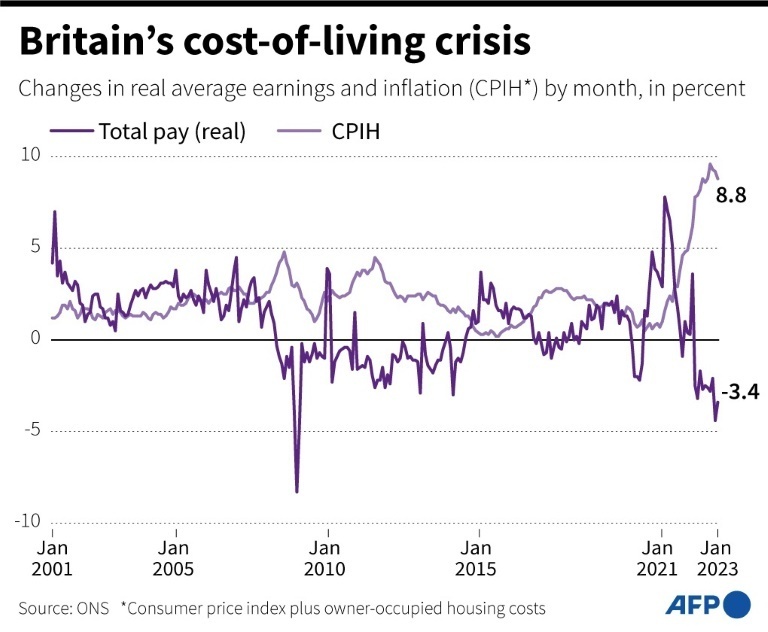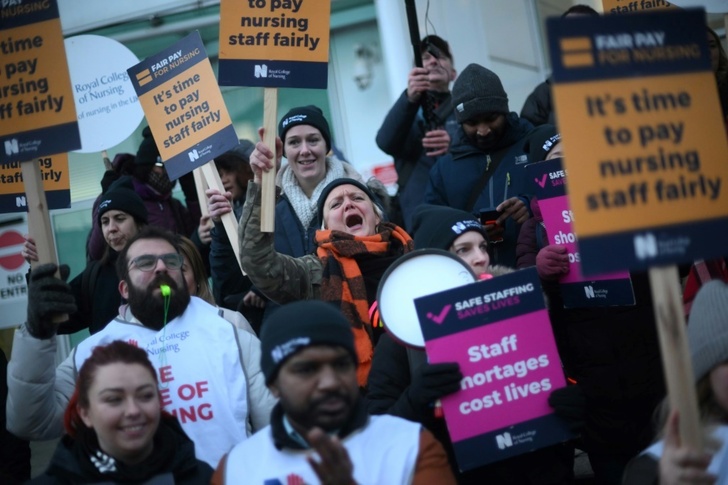The UK government and unions representing various health workers in England said Thursday they have agreed a deal to increase pay by 5 percent in the next financial year, potentially ending damaging strikes.
The package, impacting around one million National Health Service (NHS) staff, will also include a further 2.0 percent rise to this year's salaries and a one-off bonus worth at least £1,250 ($1,510) per person.
It follows months of unprecedented industrial action by nurses, paramedics, emergency call handlers, midwives and others, which was paused to allow for two weeks of formal negotiations with ministers.
The main unions -- including the Royal College of Nursing, which staged its first ever walk-out in December -- said they will recommend accepting the offer, which also covers working conditions.
"Members took the hardest of decisions to go on strike and I believe they have been vindicated today," RCN General Secretary Pat Cullen said in a statement.
"It is not a panacea, but it is real tangible progress and the RCN's member leaders are asking fellow nursing staff to support what our negotiations have secured."
But Sharon Graham, who heads the smaller Unite union representing around 100,000 NHS workers, said it was not backing the deal, although the offer would still be put to members.
Prime Minister Rishi Sunak hailed the agreement as "affordable for the taxpayer" and allowing his government "to deliver on my promise to halve inflation".
- Soaring inflation -
"We have taken a reasonable approach throughout," he added, in the face of criticism from opposition parties and unions that "dither and delay" had led to many days of avoidable strikes.
They have further strained the crisis-plagued NHS, which is still reeling from the pandemic and has seen waiting times soar for everything from doctors' appointments to routine surgery.
Sunak took power in October with the UK grappling with decades-high inflation, and insisted the country could not afford hefty public sector pay rises.
His ministers initially maintained that pay deals for the current fiscal year ending next month could not be revisited.

Health Secretary Steve Barclay, who led negotiations with the unions, said the pay rises were "fair".
In interviews with broadcasters, he would not detail exactly how they would be funded but insisted it would not come from cuts to "patient-facing" services.
The agreement does not cover junior doctors, who this week held a three-day strike to pressure the government to agree to an inflation-busting salary hike.
The doctors say years of below-inflation increases mean they have effectively had a 26 percent pay cut since 2008.
jj/phz/gw
© Agence France-Presse
Your content is great. However, if any of the content contained herein violates any rights of yours, including those of copyright, please contact us immediately by e-mail at media[@]kissrpr.com.
Source: Story.KISSPR.com

